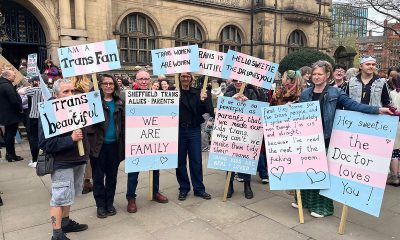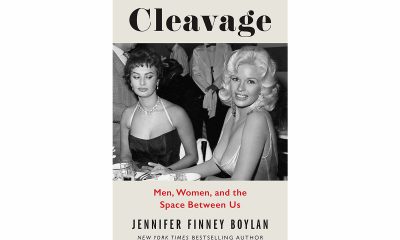Books
When artists we love behave badly
New book ‘Monsters’ explores this common fan dilemma

‘Monsters: A Fan’s Dilemma’
By Claire Dederer
c.2023, Alfred A. Knopf
$28/288 pages
Recently, I listened to an audio version of “The Sorcerer’s Stone,” the first of J.K. Rowling’s “Harry Potter” series. I cheered when Rowling said Dumbledore is gay.
Yet, I wondered, should I read the Potter books (no matter how much I love them) when Rowling has made hurtful remarks about trans people?
That is the question many fans ask today: What do we do when artists make art we love, but behave badly?
“Monsters: A Fan’s Dilemma,” by memoirist and critic Claire Dederer delves into this vexing question.

This perplexing query has no “right” answer that works for everyone. Yet, if you enjoy art, you’re likely to keep wrestling with it.
A book delving into this conundrum could be as outdated as the last news cycle. The cancel culture debate has engulfed social media for eons.
Yet, Dederer’s meditation on the relationship between art and its fans is provocative and entertaining. Reading “Monsters: A Fan’s Dilemma” is like downing two, three, maybe four espressos after a couple of cups of strong coffee.
One minute, you may feel that Dederer has it exactly right. The next moment, you might wonder what planet she’s on.
I applauded Dederer when she wrote, “There is not some correct answer…The way you consume art doesn’t make you a bad person, or a good one.”
But I wanted to throw the book across the room as I read that Dederer preferred Monty Python over queer comedian, writer, and actor Hannah Gadsby. “Listen, I’d rather watch the Pythons than Gadsby any day of the week,” Dederer writes.
To be fair, Dederer opines about Monty Python to make a point about the “monster” of exclusion. “None of these guys has the bandwidth,” she writes about Monty Python, “to even entertain the idea that a woman’s or person of color’s point of view might be just as ‘normal’ as theirs, just as central.”
Dederer, the author of two critically acclaimed memoirs “Love and Trouble: A Midlife Reckoning” and “Poser: My Life in Twenty-Three Yoga Poses,” struggles, as a fan and critic, with many types of monsters.
Dederer, who started out as a movie critic, began grappling with monsters in 2014. Then, “I found myself locked in a lonely–okay, imaginary–battle with an appalling genius,” she writes.
The “appalling genius” was filmmaker Roman Polanski, who, Dederer reports, raped a 13-year-old. Despite her knowledge of Polanski’s crime, “I was still able to consume his work,” Dederer writes, “[though] he was the object of boycotts and lawsuits and outrage.”
Her gallery of monsters contains the usual hetero male suspects from Bill Cosby to Woody Allen. Dederer deplores Allen’s behavior, but considers “Annie Hall” to be the greatest 20th century film comedy. She finds “Manhattan” unwatchable because Allen’s character dates a high school girl, but considers “Annie Hall” to be better than “Bringing Up Baby.” (Mea culpa: I love “Annie Hall.” But, better than “Baby?)
For Dederer, monsters aren’t only male or hetero. She wonders, for instance, if the brilliant poet Sylvia Plath, was a monster because she abandoned her children for her art.
Dederer muses about the actor Kevin Spacey (who will be on trial in June for alleged sexual assault in the United Kingdom), Michael Jackson, and J. K. Rowling.
“One of the great problems faced by audiences is named the Past,” Dederer writes, “The past is a vast terrible place where they didn’t know better.”
‘But, Dederer reminds us: sometimes they did.Queer writer Virginia Woolf (author of the luminous “Mrs. Dalloway” and the gender-bending “Orlando”) is a god to many queers. Yet, Dederer reports, Woolf, though married to Leonard Woolf, who was Jewish, made flippant anti-Semitic remarks in her diaries. You could say Woolf was just “joking” as people in her time did. Yet, Dederer reminds us, gay author E.M. Forster wrote in a 1939 essay, “…antisemitism is now the most shocking of all things.”
I wish Dederer, who writes of racism and sexism in art, had written about the homophobia in art (in the past and present). I’d have loved it if she’d mused on the brilliant queer, anti-Semitic, racist writer Patricia Highsmith who gave us the “Talented Mr. Ripley.”
I’d liked to have seen some mention of Islamophobia, ableism and racism against Asian-Americans and indigenous people in art in “Monsters.”
Despite these quibbles, “Monsters: A Fan’s Dilemma” is a fascinating book. There’s no calculator (as Dederer wishes there was) to tell us whether we should go with the art we love or renounce the work of the artist whose behavior we deplore. But, Dederer turns this dilemma into an exhilarating adventure.
The Blade may receive commissions from qualifying purchases made via this post.
Books
How one gay Catholic helped change the world
‘A Prince of a Boy,’ falls short of author’s previous work

Brian McNaught, the pioneering gay activist and author of 1986’s “On Being Gay” and 1993’s “Gay Issues in the Workplace,” has written a personal account about his Catholic faith and homosexuality. It is a memoir without much substance.
“A Prince of a Boy: How One Gay Catholic Helped Change the World” (Cascade Books) is a strong personal statement by McNaught. He helped change family relationships. He helped change attitudes about homosexuality. He helped change workplaces, but the world?

In January 2023, the Catholic News Service reported that Pope Francis announced that, “being homosexual is not a crime.” In December 2023, NPR reported that Pope Francis approved “Catholic blessings for same-sex couples, but not for marriage.” Francis died Monday at age 88. Although Catholics may not see homosexuality as a crime, they see sex outside of marriage as a sin. They see same-sex marriage as a sin.
In 2021, Gallup reported that membership in the Catholic Church had declined 20 percent since 2000. In 2025, the Pew Research Center’s Religious Landscape Study found that nearly 40 percent of Americans identified as Protestant, while the same study found that only 19 percent identified as Catholic.
McNaught devotes much of his book to his life as a gay Catholic. It is challenging to read about his personal struggle. Some readers may find it interesting. Others might find it boring. Catholic readers may find it more compelling than Protestant readers.
As the above statistics prove, McNaught has much more work to do to change the Catholic Church’s views about homosexuality. We should be glad for his contribution to the debate within the Catholic Church. We should pray for full acceptance of gays in the Catholic Church.
“A Prince of a Boy” becomes more interesting when McNaught describes his work as an educator on LGBTQ issues. He has had an impact on workplace policies, academic programs, and public education, and his lectures, books, and other materials are widely used.
Based on my experience in the federal government and volunteering with LGBTQ organizations from the Bay Area to Washington, D.C., I believe McNaught’s work as an educator has improved LGBTQ lives, careers, and families. During the Clinton administration, I gave many copies of “Gay Issues in the Workplace” to personnel directors. I felt their staff could benefit from reading it. I thought it would help the lives and careers of my federal LGBTQ colleagues.
McNaught’s “A Prince of a Boy” was released in December 2024. Anti-gay crusader Anita Bryant died the same month. Bryant campaigned against a gay rights law in Florida. She began a national campaign against gays.
When Bryant successfully reversed a gay rights ordinance in Dade County, Florida, McNaught wrote the important essay “Dear Anita, Late Night Thoughts of an Irish Catholic Homosexual.” The essay is not in “A Prince of a Boy”; however, McNaught mentions Bryant.
In his training programs, McNaught describes homosexuals as journeying from confusion to denial to acceptance to pride. “Anita Bryant and AIDS brought Gay people to identity pride very quickly,” McNaught writes. San Francisco Supervisor Harvey Milk (1930-1978) and other activists reached similar conclusions about Bryant’s vicious anti-gay campaign.
McNaught helped change the LGBTQ world and brought pride to many people’s lives. McNaught walks in pride, works in pride, and educates others in pride.
“A Prince of a Boy” is a disappointing book. It provides small details about Brian McNaught’s large, proud life. A meaningful biography about this great gay leader is long overdue.
The Blade may receive commissions from qualifying purchases made via this post.
Books
‘Pronoun Trouble’ reminds us that punctuation matters
‘They’ has been a shape-shifter for more than 700 years

‘Pronoun Trouble’
By John McWhorter
c.2025, Avery
$28/240 pages
Punctuation matters.
It’s tempting to skip a period at the end of a sentence Tempting to overuse exclamation points!!! very tempting to MeSs with capital letters. Dont use apostrophes. Ask a question and ignore the proper punctuation commas or question marks because seriously who cares. So guess what? Someone does, punctuation really matters, and as you’ll see in “Pronoun Trouble” by John McWhorter, so do other parts of our language.

Conversation is an odd thing. It’s spontaneous, it ebbs and flows, and it’s often inferred. Take, for instance, if you talk about him. Chances are, everyone in the conversation knows who him is. Or he. That guy there.
That’s the handy part about pronouns. Says McWhorter, pronouns “function as shorthand” for whomever we’re discussing or referring to. They’re “part of our hardwiring,” they’re found in all languages, and they’ve been around for centuries.
And, yes, pronouns are fluid.
For example, there’s the first-person pronoun, I as in me and there we go again. The singular I solely affects what comes afterward. You say “he-she IS,” and “they-you ARE” but I am. From “Black English,” I has also morphed into the perfectly acceptable Ima, shorthand for “I am going to.” Mind blown.
If you love Shakespeare, you may’ve noticed that he uses both thou and you in his plays. The former was once left to commoners and lower classes, while the latter was for people of high status or less formal situations. From you, we get y’all, yeet, ya, you-uns, and yinz. We also get “you guys,” which may have nothing to do with guys.
We and us are warmer in tone because of the inclusion implied. She is often casually used to imply cars, boats, and – warmly or not – gay men, in certain settings. It “lacks personhood,” and to use it in reference to a human is “barbarity.”
And yes, though it can sometimes be confusing to modern speakers, the singular word “they” has been a “shape-shifter” for more than 700 years.
Your high school English teacher would be proud of you, if you pick up “Pronoun Trouble.” Sadly, though, you might need her again to make sense of big parts of this book: What you’ll find here is a delightful romp through language, but it’s also very erudite.
Author John McWhorter invites readers along to conjugate verbs, and doing so will take you back to ancient literature, on a fascinating journey that’s perfect for word nerds and anyone who loves language. You’ll likely find a bit of controversy here or there on various entries, but you’ll also find humor and pop culture, an explanation for why zie never took off, and assurance that the whole flap over strictly-gendered pronouns is nothing but overblown protestation. Readers who have opinions will like that.
Still, if you just want the pronoun you want, a little between-the-lines looking is necessary here, so beware. “Pronoun Trouble” is perfect for linguists, writers, and those who love to play with words but for most readers, it’s a different kind of book, period.
The Blade may receive commissions from qualifying purchases made via this post.
‘The Cost of Fear’
By Meg Stone
c.2025, Beacon Press
$26.95/232 pages
The footsteps fell behind you, keeping pace.
They were loud as an airplane, a few decibels below the beat of your heart. Yes, someone was following you, and you shouldn’t have let it happen. You’re no dummy. You’re no wimp. Read the new book, “The Cost of Fear” by Meg Stone, and you’re no statistic. Ask around.

Query young women, older women, grandmothers, and teenagers. Ask gay men, lesbians, and trans individuals, and chances are that every one of them has a story of being scared of another person in a public place. Scared – or worse.
Says author Meg Stone, nearly half of the women in a recent survey reported having “experienced… unwanted sexual contact” of some sort. Almost a quarter of the men surveyed said the same. Nearly 30 percent of men in another survey admitted to having “perpetrated some form of sexual assault.”
We focus on these statistics, says Stone, but we advise ineffectual safety measures.
“Victim blame is rampant,” she says, and women and LGBTQ individuals are taught avoidance methods that may not work. If someone’s in the “early stages of their careers,” perpetrators may still hold all the cards through threats and career blackmail. Stone cites cases in which someone who was assaulted reported the crime, but police dropped the ball. Old tropes still exist and repeating or relying on them may be downright dangerous.
As a result of such ineffectiveness, fear keeps frightened individuals from normal activities, leaving the house, shopping, going out with friends for an evening.
So how can you stay safe?
Says Stone, learn how to fight back by using your whole body, not just your hands. Be willing to record what’s happening. Don’t abandon your activism, she says; in fact, join a group that helps give people tools to protect themselves. Learn the right way to stand up for someone who’s uncomfortable or endangered. Remember that you can’t be blamed for another person’s bad behavior, and it shouldn’t mean you can’t react.
If you pick up “The Cost of Fear,” hoping to learn ways to protect yourself, there are two things to keep in mind.
First, though most of this book is written for women, it doesn’t take much of a leap to see how its advice could translate to any other world. Author Stone, in fact, includes people of all ages, genders, and all races in her case studies and lessons, and she clearly explains a bit of what she teaches in her classes. That width is helpful, and welcome.
Secondly, she asks readers to do something potentially controversial: she requests changes in sentencing laws for certain former and rehabilitated abusers, particularly for offenders who were teens when sentenced. Stone lays out her reasoning and begs for understanding; still, some readers may be resistant and some may be triggered.
Keep that in mind, and “The Cost of Fear” is a great book for a young adult or anyone who needs to increase alertness, adopt careful practices, and stay safe. Take steps to have it soon.
The Blade may receive commissions from qualifying purchases made via this post.
-

 Federal Government2 days ago
Federal Government2 days agoHHS to retire 988 crisis lifeline for LGBTQ youth
-

 Opinions2 days ago
Opinions2 days agoDavid Hogg’s arrogant, self-indulgent stunt
-

 District of Columbia2 days ago
District of Columbia2 days agoD.C. police seek help in identifying suspect in anti-gay threats case
-

 Opinions2 days ago
Opinions2 days agoOn Pope Francis, Opus Dei and ongoing religious intolerance












